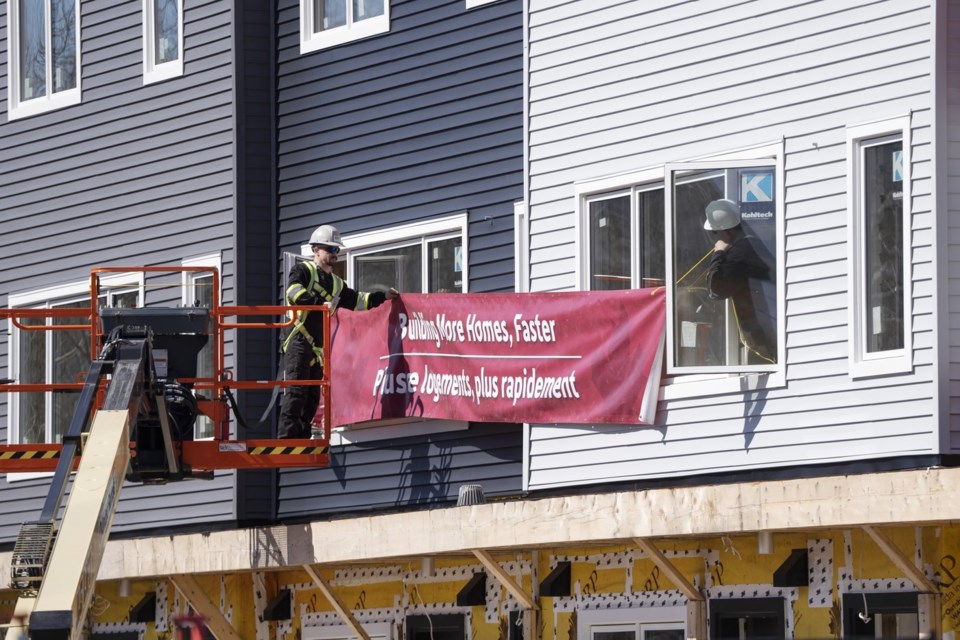HALIFAX — Canada’s national housing agency says the number of annual residential construction starts in Nova Scotia must double for ten years for the market to reach pre-pandemic affordability levels, a target the province says is doable — with multi-level government support.
Lukas Jasmin-Tucci, an economist with Canada Mortgage and Housing Corporation, said Nova Scotia should aim to hit 12,540 housing starts a year until 2035. The agency estimates the province is on track this year to hit about 5,450 housing starts, which refer to the beginning of construction on a new home or multi-unit residential building.
"If we compare (Nova Scotia) to other regions, this is one where there's a great need for new construction," Jasmin-Tucci said in an interview Wednesday.
Nova Scotia’s minister of growth and development says the province recognizes the urgency to address the shortage of affordable homes, and is aiming for an even higher target — 14,000 housing starts annually for 10 years.
"We want to build more housing, and we will continue to work with other levels of government, but we have to be on the same page," Colton LeBlanc said in an interview.
Surpassing the federal housing agency's targets is "within our lens, doable. But again, we will have to work with other parties involved," the minister said.
Jasmin-Tucci said Nova Scotia, and the Halifax Regional Municipality in particular, has experienced significant and rapid population growth since 2020, and housing supply has not kept up. "In the Halifax area, the price growth was much larger than we saw in other centres, and we didn't see some kind of (cost) correction after that," he said.
Nova Scotia is projected to need far more housing to reach 2019 affordability levels compared with the rest of Atlantic Canada. The housing agency defines pre-pandemic affordability differently across the country; in Nova Scotia, it is defined as adjusted house prices that are either no higher than 30 per cent of the average gross household income, or no higher than their 2019 levels in the more unaffordable regions of the province.
The housing agency says Prince Edward Island should work toward 2,180 housing starts annually for 10 years to restore affordability, but it projects that only 1,276 projects will start in that province this year. By contrast, in Newfoundland and Labrador and New Brunswick, no additional housing supply is needed because both provinces are "expected to build sufficient market housing to maintain average affordability by 2035," Jasmin-Tucci said.
"This is not to say that there are no housing challenges in these areas. The focus of the report is on average affordability and does not reflect that there are continuing challenges with, for example, homelessness," he said.
And while housing supply in Nova Scotia has not kept up with population growth, residential development has significantly ramped up in the past couple years, Jasmin-Tucci said.
LeBlanc said the province is so far exceeding its goals in the first 18 months of its five-year housing plan, with a range of development projects in the works that are expected to create 51,000 new housing units. As well, housing starts are up 38 per cent year over year, and LeBlanc said his department is projecting the province will surpass the housing agency's prediction and hit 6,000 housing starts this year.
But the province needs help from Ottawa and municipalities, he said. The minister pointed to the new Crosswoods affordable housing project in Cole Harbour, N.S., in partnership with a community housing organization called Rooted. Nova Scotia put $1.4 million and allocated another $3.1 million from Ottawa's National Housing Strategy fund that the province manages.
Rooted is using the money to build a new 18-unit complex, which will include nine affordable units, and is keeping another 84 affordable units on the rental market by purchasing two apartment buildings in Dartmouth. A one-bedroom unit will cost $770 a month; a three-bedroom will cost $1,136 a month.
LeBlanc said the project is a major success, but he said it is "unacceptable" it took 18 months to reach an agreement with Halifax city council to build it.
"I think there's some serious considerations that have to occur with (Halifax) and their processes," he said. "We have a number of developers. We have number of folks that even in the not-for-profit sector that want to get housing built. So we need to reduce barriers."
This report by The Canadian Press was first published July 23, 2025.
Lyndsay Armstrong, The Canadian Press



